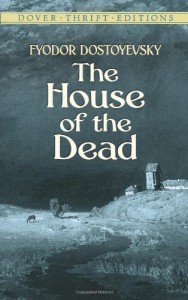A prison story - Gulag style

This is one of those very rare books where I read the first two sentences and know instantly that I was going to love it. The House of the Dead is one of the post-imprisonment books that Dostoevsky wrote, and in short, it is the story of a man sentenced to ten years imprisonment for the murder of his wife. The story is set in 19th Century Russia during the reign of the Czars and imprisonment pretty much meant exile to the frozen wastes of Siberia. Further, even if one was not imprisoned in one of the 'Special Divisons' (the camp in which this book is set), one is still imprisoned not only by the vast emptiness and frozen wastes of Siberia, but also due to the fact one once one has been sent there, unless special dispensation was granted by the Czars, one would never leave Siberia. In many ways it mimics the method of incarceration by the British in the 18th and 19th Centuries, where convicts would be sent out to the colonies and one would only return on pain of death.
Dostoevsky did spend four years in one of the Gulags, and it was only by the grace of the ruling Czar that he was allowed to return. His crime was being involved with a socialist group connected with the intelligensia of Russia. While his group was not necessarily violent in nature, there were a number of violent revolutionary groups in Russia at the time and Dostoevsky happened to get caught up in the purges. Prior too his imprisonment Dostoevsky had already made his mark as a writer, however many of his pieces were pretty much overlooked. It was not until he returned from exile (as is the case with many other writers) that he went on to write his classics, such as the Brothers Karamazov and Crime and Punishment (a bit of which I will discuss here).
However, this is not an autobiographical novel. Dostoevsky does not write about his experiences, but the experiences of a fictional character. Maybe it was a form of self-censorship: by writing about a fictional character he would be less likely to attract unwanted attention from the powers that be. By writing a true story about life in the Gulags could easily have brought trouble upon himself. As such, by writing a fictional account he could easily say that the events in the book never actually happened, however he was using his experiences to outline what life was like in the gulags.
The House of Death is not a continuous story but rather jumps all over the place. It is not a linear narrative that intends to tell a story, but rather written as the thoughts and recollections of the narrator. There is a large section at the beginning where he describes his first experiences in the Gulag, but as time drags on everything tends to settle down. As such, he ends up focusing on the characters, and descriptions of everyday life. Obviously it is the first section where he is learning and discovering about life in the gulag that brings out the most detail.
Dostoevsky discusses punishment in the book, and I suspect that it is a glimpse into what he intended to write with regards to his book Crime and Punishment (however at this stage I have not read the book so can't comment beyond speculation, though a quick look on Wikipedia suggests that it is not). His argument here is that while in some cases punishment may appear consistent with a crime, depending on the culprit, it is not. For instance, if a peasant were to murder somebody, and be sentenced to ten years in the Gulag, he would not be too concerned as life both before and after the sentence was harsh, and in some ways, life in the Gulag is better because at least one is fed (barely), clothed, and given shelter. However, for one of the elite to be punished for the same crime in the same way, the punishment is much harsher, since all of the luxuries and benefits of his class is taken away from him. In fact it is very much the same today as there is actually a class of people who, if released from prison, will immediately go an commit a crime so that they can return simply because life in prison is so much easier.
Dostoevsky is very detailed in the book, with everything from the food, the beds, to life in the hospital, the festive period of Christmas, and details on the rare showers that the prisoners might have. When we enter the prison, we hear about how money exists, but is generally kept hidden from the guards, how trades people will go and perform their trades, and be paid for them, while others work in the work gangs. We learn of food and vodka being smuggled into the prison, and of prisoners becoming exceedingly violent while under the influence. We also learn that all books, with the exception of the New Testament, are banned.
I guess the book finishes off in the same way that it begins. At the opening we are told that it is about life in the Gulag, and how he survived, and by the end we see that he survived. He is finally released, and taken to the blacksmith to have his fetters removed. Once free, Dostoevsky writes 'Freedom, new life, resurrection from the dead … what a glorious moment!'.
 2
2
 8
8


